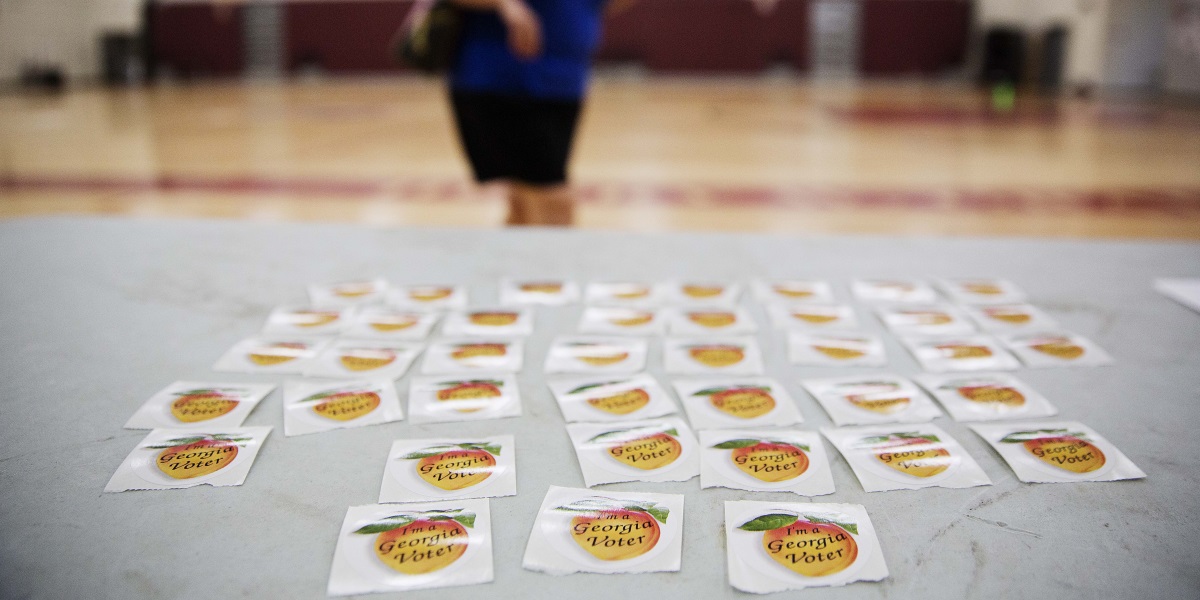14 Canvassers Now At Center Of Ga. Voter Fraud Probe Handed To AG

A more than 3-year-old voter registration fraud inquiry by the office of candidate for governor, and Republican Secretary of State Brian Kemp shifted course Wednesday. Investigators revealed publicly for the first time that their original target, an organization focused on registering voters of color and young people, was effectively cleared in the case.
Instead, investigators turned the focus to at least 14 canvassers associated with the New Georgia Project, founded by Democratic gubernatorial candidate Stacey Abrams. They claim the canvassers submitted fraudulent voter registration applications.
Investigators said the 14 canvassers, who denied submitting false statements, were paid directly by at least two New Georgia Project contractors, including Field Strategies.
“It was kind of a very fluid situation with the canvassers coming and going,” said Russell Lewis, an investigator with the Secretary of State. “There was really no way to establish an employee-employer relationship with those individuals. So, we looked at it as if they were independent contractors working for either one of these groups.”
The canvassers were not paid based on the number of voter registration applications they turned in, Lewis said.
The State Election Board, chaired by Kemp, voted to approve the recommendation of investigators from his office, who asked that the case be transferred to the office of the state Attorney General.
Lawyers from the Attorney General’s office will represent the Secretary of State before an administrative law judge who will determine whether fraud occurred. The state Elections Board makes a final decision on the case that could mean up to a $5,000 fine for the canvassers.
David Worley, a member of the board, wanted investigators to explain in more detail and provide evidence for why the New Georgia Project was no longer named in the case.
“Either you put the evidence in there about their alleged involvement, or their lack of involvement,” Worley said. “I don’t think it’s fair, or the correct procedure, just to come back with the canvassers and not try to determine other responsibility, or clear those folks from responsibility.”
During the run-up to the 2014 midterm elections, 16 counties around the state reported problems with voter registration applications from the New Georgia Project, including Fulton, Cobb, Coweta, Gwinnett, DeKalb, Paulding, Athens-Clarke and Bartow.
Of the roughly 86,000 new voter registration applications the New Georgia Project has said it collected around the 2014 election, investigators found 208 that they said showed signs of fraud, meaning everything from inaccuracies in dates of birth, to forged signatures.
“We feel that we have good internal controls. Where there were problems, people were terminated. A lot of the concerns are things that we actually flagged ourselves,” said the Rev. Raphael Warnock, pastor of Ebenezer Baptist Church and chair of the New Georgia Project board. “We are happy that we have been cleared.”
Finding unregistered voters can be an expensive and laborious process, and the New Georgia Project is unique nationally in its approach. Although, some Democrats have said the New Georgia Project should be signing up more people, given the amount of money it has raised from private donors.
Abrams has long said the key to Democrats winning a statewide election in Georgia are the unregistered black, Hispanic, Asian-American and young people that the New Georgia Project seeks out.
In 2014, when the Secretary of State’s office first launched an investigation into the New Georgia Project, it drew national attention. The group’s counter-suit, alleging voter suppression, was thrown out.
“I submit that this has been a sophisticated operation in voter suppression,” said Warnock, about the Secretary of State’s investigation, “Anybody who is concerned about the voices of ordinary people, and their right to vote, ought to be concerned about how this thing has taken place.”
Kemp later responded to Warnock in the latest round of a feud that’s likely to continue.
“It’s sad that a spiritual leader like Rev. Warnock would make such disparaging and patently false statements,” he said in an emailed statement. “No level of fraud is acceptable and I will continue to fight for secure, accessible, and fair elections in Georgia.”
9(MDAxODM0MDY4MDEyMTY4NDA3MzI3YjkzMw004))








